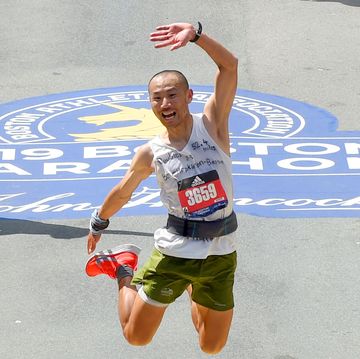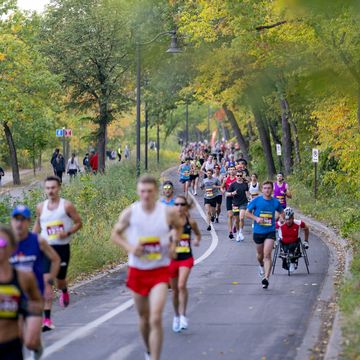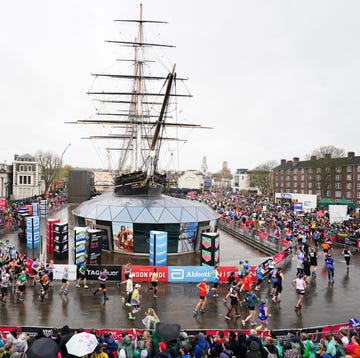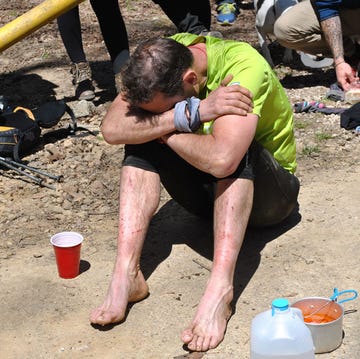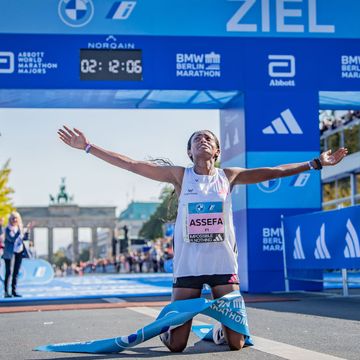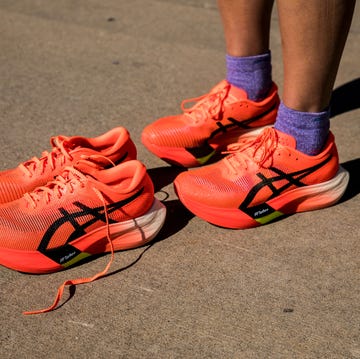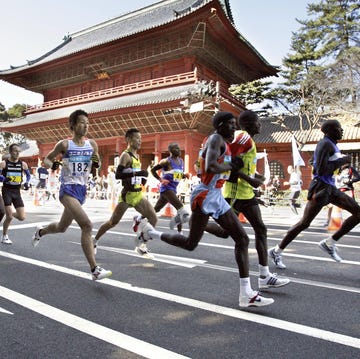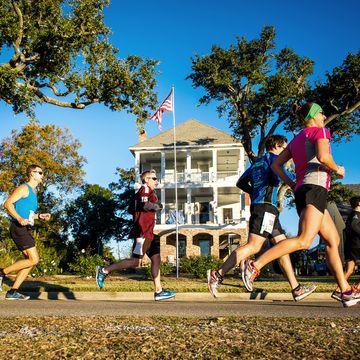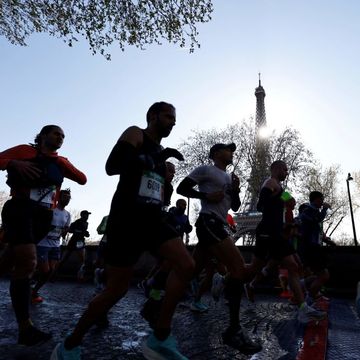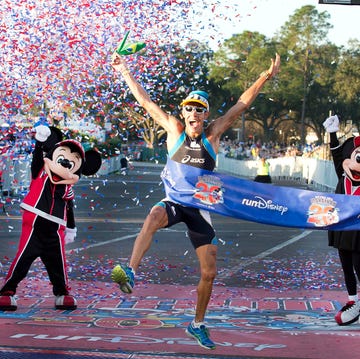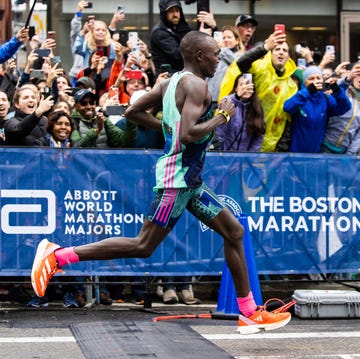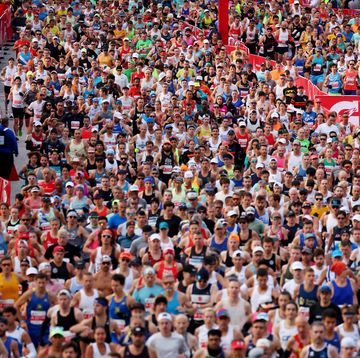On Sunday, Sara Hall will run the Chicago Marathon, her second attempt at the distance. Does this mean that, at age 32, she’s now a marathoner?
This is a time of upheaval and transition for Hall and her husband, two-time Olympic marathoner Ryan Hall. The couple returned on Friday from altitude training in Ethiopia, accompanied by thefour Ethiopian sisters they’ve adopted and will likely enroll in school in Redding, California. That’s a joyous but tiring distraction for Hall as she tries to determine whether her competitive future lies with the marathon.
In her debut in Los Angeles in March, she slowed significantly after 16 miles and finished 22nd in 2:48:02. Although that time was more than five minutes short of the qualifying standard for the 2016 U.S. Olympic Marathon Trials, she doesn’t have to run Chicago to be able to run in the trials; her half marathon times, including a 1:10:50 in Houston in January and a 1:10:49 at Gold Coast in Australia in July, count as qualifiers for the February 13 race in Los Angeles.
But, she told Runner's World by email from Ethiopia, “I didn't feel like I really got to experience the marathon distance at LA. The only reason to run the marathon trials is to be in contention to make the team, and to be prepared to do that I wanted to race the distance at least once [more] before.”
Hall’s career, dating to her 2000 Foot Locker national cross country title in high school, has a range of highlights, including a 2011 Millrose Games victory in the 1500, a Pan American Games steeplechase gold medal that year, and a 2012 U.S. cross country title. She’s made three world indoor championships teams (without a medal) and two world cross country squads. But she’s never been in the outdoor world championships or the Olympic Games.
What sets Hall apart from any other American distance runner of her stature is the troubling time she’s had finding a specialty. Her three U.S. Olympic Trials appearances were in different events: the 5,000 in 2004, the 1500 in 2008, and the 3,000-meter steeplechase in 2012, when she was eighth, her highest trials finish.
Disappointing Debut
Her Los Angeles experience provided no conclusive answer about the marathon. She tackled yet another distance in June, running her first 10,000 on the track as a professional in 32:50.68. That got her into the U.S. championships, but she was just 12th there in 34:03.25, more than two minutes behind the top three.
“The race was 30 degrees warmer than my previous race, and unfortunately I still have a lot of room to improve in that area,” Hall said.
GET MORE RUNNER'S WORLD: Sign up for the RW Daily newsletter
For her second marathon, Hall has selected a flatter course on what should be a cooler day than she experienced in Los Angeles. That earlier race, she said, “exposed all my weaknesses as an athlete. They are things I'm always trying to work on—strengthening and callousing my legs to lots of downhill pounding, and running in heat, but I'm clearly not there yet.”
The uphills in particular were her undoing, and during one stretch between miles 21 and 23, “I felt like I was in one of those dreams where you are running in quicksand,” she wrote in her blog. But Hall remains convinced her overall fitness was good. Just 13 days after Los Angeles, at the world cross country championships, she was 20th and the top American woman, in perhaps her most rewarding race of 2015.
In Chicago, her main goal is to experience the full marathon distance “and see what my ability is in the event,” she said. Though naturally aggressive, she noted that, with the marathon trials ahead in February, “I am probably going to err on the side of caution so that I make sure to come off it well.” She did not specify a time goal for Chicago.
Hall’s pre-Chicago workouts reached up to 120 weekly miles in Addis Ababa, which, at an altitude of 9,000 feet, is 2,000 feet higher than Flagstaff, Arizona, the Hall’s U.S. altitude base.
Her training volume was higher in the early part of her Chicago cycle than before Los Angeles. She was anxious to see how her hardest workouts would be affected by the change.
“This buildup was much more of a grind, and I felt pretty tired the whole time,” she said. This week’s taper could remedy that, but, Hall said, “it's all very experimental since I'm so new to the event.”
Family Ties
With their suddenly expanded family, the Halls are “no longer free to roam the earth like gypsies, training and racing wherever and whenever,” Sara wrote in her blog. The four girls understand Ryan’s and Sara’s livelihood, cognizant as they are of Ethiopia’s long-distance running tradition. Jasmine, the eight-year-old, watched the recent world championships on TV and exclaimed, “I want to train to beat Kenya!”
In suddenly transforming from a family with no children to one with four, Hall and her husband “are not in denial that it will be hard work,” she said. “It's a leap of faith. I didn't know that for sure I could handle it, but I believed we are capable of figuring it out and finding the resources and support we need to be successful.
“I love my girls and believe in what we are doing,” Hall said. “To me, living a selfish existence revolving around running my whole life would be selling out. That's not who I am and not what I've always envisioned for my life.”
Bringing them back to the United States just days before the Chicago Marathon “isn't the timing I would have chosen, but international adoption is probably the thing you have the least control over,” Hall said.
The Halls took a respite from their Ethiopian training to do the Great North Run, a half marathon in England on September 13. Sara was seventh in 1:15:45.
“Obviously it was not at all what I was hoping for,” she said of the slowest half marathon of her career. “My body was definitely off,” she said, and she spent much of the day after the race throwing up. She’s learned from her husband ”that half marathons when [in] marathon training can have mixed results, so I've tried to put it to rest and not let it affect my confidence.”
Ryan ran 1:09:38 at the Great North Run, a disappointing performance in a year that also included dropping out of Los Angeles in March. Since placing second at the 2012 marathon trials, Ryan has finished one marathon, the 2014 Boston, where he was 20th in 2:17:50.
“It has been difficult seeing Ryan go through what he has the last few years,” Sara said. ”He will have great periods of training where he looks like his old self and gets excited and hopeful, and then out of nowhere fall into a pit of fatigue. He will then crawl his way out and believe and hope again and be training well, only to get knocked down by something else.
“He is doing things the right way, conservatively, but it's like he has a short leash, one step too far and his body no longer absorbs the training,” Sara said. “He has some hormonal imbalances which could quickly be fixed illegally by microdosing, but that's obviously not the path he's taking. I think he can get back to where he was, but he won't be able to do it how he has done it in the past. He has been training intensely for a long time and that takes a toll on your body. The upside is, you see people like Meb [Keflezighi] that successfully find a new way that works for them.”
Unlike her husband, Sara has numerous options in play for the Olympic year of 2016. She hasn’t ruled out a return to the steeplechase, and could contend for a spot on the 10,000 team as well. A strong performance in Chicago on Sunday could clarify matters quite a bit.


